#Hydroponic Vegetables Online
Text

Buy hydroponic vegetables online with the best offer, it is good for health. We have a huge number of products you can visit near our store.
0 notes
Text
Hydroponic Salad Store In Delhi NCR | Inhydrogreens

When it comes to choosing greens from the Hydroponic Salad Store In Delhi NCR, this is one of the most frequently asked questions. By examining the vegetables' colour and quality, you may determine whether they are fresh and of high quality. Given the prevalence of online shopping, you can check the ratings and reviews to confirm that the retailer is providing you with the highest-quality greens.
#Buy Fresh Herbs Online#Mix Lettuce Box#Buy Online Microgreens Box#Buy Hydroponic Microgreens#Hydroponic Vegetables Online#Leafy Green Vegetables in Delhi#Fresh Herbs Online Delhi#Hydroponic Vegetables in Delhi#Buy Hydroponic vegetables#Online leafy vegetables
0 notes
Text
Hydroponics, a method of growing plants without soil by using mineral nutrient solutions in an aqueous solvent, has revolutionized modern agriculture. One standout in this innovative field is Frugivore, a brand synonymous with quality and sustainability in hydroponic vegetable cultivation.
The Frugivore Advantage
Frugivore's hydroponic vegetables are a testament to cutting-edge agricultural practices. By eschewing traditional soil-based farming, Frugivore ensures that their produce is grown in a controlled, sterile environment, free from pests and soil-borne diseases. This results in vegetables that are not only more robust and nutritious but also consistently available regardless of season or weather conditions.
Nutrient-Rich and Chemical-Free
One of the hallmarks of Frugivore's hydroponic vegetables is their exceptional nutritional profile. The controlled environment allows for precise regulation of nutrient intake, ensuring that plants receive optimal levels of all necessary minerals and vitamins. This precision leads to produce that often surpasses its soil-grown counterparts in terms of nutrient density.
Furthermore, Frugivore's commitment to sustainability and health means that their hydroponic vegetables are grown without the use of harmful pesticides or herbicides. This results in cleaner, safer produce that retains its natural flavors and health benefits. Consumers can enjoy peace of mind knowing that what they are eating is free from chemical residues.
Freshness and Flavor
Hydroponically grown vegetables from Frugivore are harvested at the peak of ripeness, ensuring maximum freshness and flavor. Because these vegetables are typically grown close to urban centers, the time from harvest to table is significantly reduced. This proximity means that consumers receive produce that is fresher and more flavorful than vegetables that have traveled long distances from traditional farms.
Environmental Sustainability
Frugivore's hydroponic systems are designed with sustainability at their core. These systems use up to 90% less water than traditional farming, making them an excellent choice for areas with limited water resources. Additionally, hydroponic farming reduces land use, allowing for the production of more food in less space, which is crucial as the global population continues to grow.
A Vision for the Future
Frugivore is not just a brand; it is a vision for the future of agriculture. By embracing hydroponics, Frugivore is helping to lead the way towards a more sustainable and efficient form of food production. Their dedication to quality, sustainability, and innovation sets a high standard in the agricultural industry, demonstrating that it is possible to produce healthy, delicious, and environmentally friendly food on a large scale.
In conclusion, Frugivore's hydroponic vegetables represent the pinnacle of modern farming techniques, offering a superior product that is as good for the planet as it is for the consumer. Whether you are looking for fresher, more nutritious vegetables or seeking to support sustainable agricultural practices, Frugivore provides an ideal solution. Experience the future of farming today with Frugivore's hydroponic vegetables.
READ MORE...Grocery Online | Online Grocery Shopping in Delhi NCR | Frugivore
#Frugivore's Hydroponic Vegetables#Fresh#Nutritious#Online Grocery Shopping in Delhi NCR#Grocery Online
0 notes
Text
Al Falaj Gardens | Gutter hydroponic systems
Falajgarden is the number one solution provider in the UAE for Gardening. We are the Irrigation item suppliers in UAE and we deal with every solution regarding Garden plant pots, Garden sprayers, Irrigation fittings, and Fertilizers for plants, when it comes to gardening, there is no one like Falajgarden. https://falajgarden.com/product-category/hydroponic-items/gutter-system/
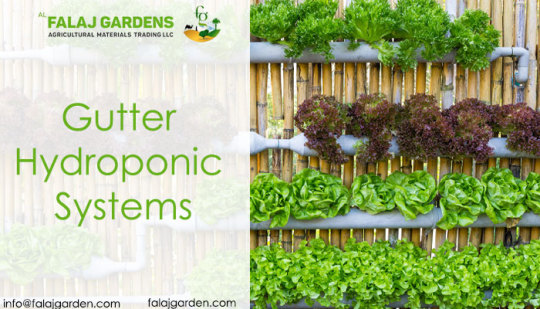
#Garden sprayers#Irrigation fittings#Garden Pots Dubai#Indoor outdoor garden plants#Drip irrigation accessories online#Vegetable Seed suppliers in UAE#Vertical garden items UAE#Agricultural grow lights Dubai#Hydroponic system supplier in UAE#Hydroponics companies in UAE#Irrigation accessories company
0 notes
Text
One of the Best DFT System in India | Farmsbazaar
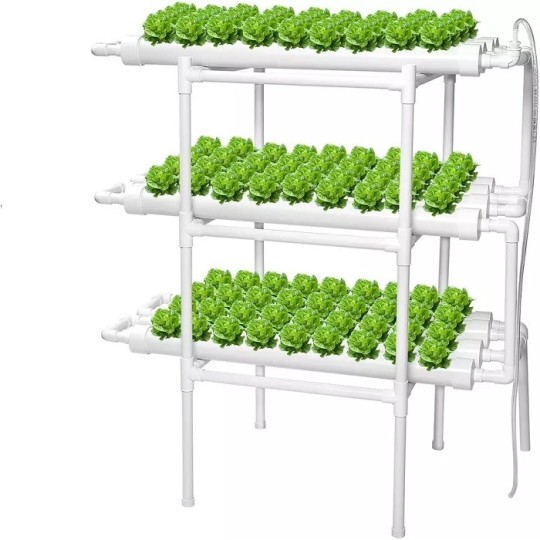
You're looking for the best DWC system for larger plants or the best DFT system for smaller ones, a DFT/DWC system is a great choice for any serious hydroponic gardener. With its efficient use of water and minimal maintenance requirements, it's a great option for anyone looking to get into growing hydroponic microgreens or other plants indoors.
#Hydroponics Store Near Me#Hydroponic Grow Supplies#Verticle NFT System#Buy DFT/DWC System#Buy Vertical NFT System#Flat Bed NFT System#Flower Seeds Online#Fruit Seeds for Home Garden#Fruit Seeds#Vegetable Seeds India#Microgreens Seeds#Polyhouse Seeds#Exotics Seeds#Grow Bags Wholesale#Hydroponic Nursery Tray online#Nursery Trays Wholesale#Nursery Tray#Net Pots Wholesale Near Delhi#Net Pots Wholesale#Hydroponic Buckets For Sale
1 note
·
View note
Photo
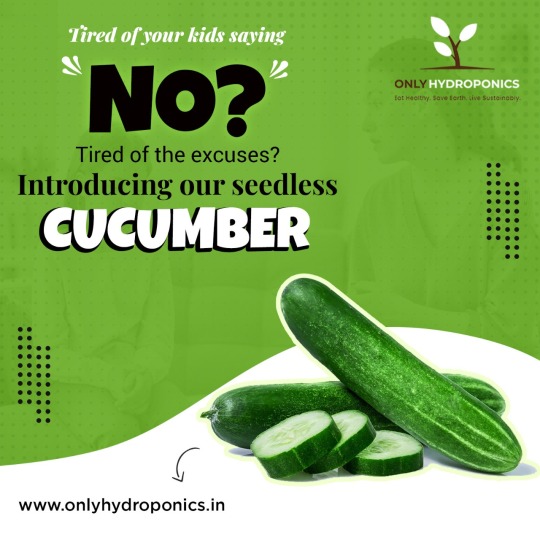
Cucumber is striped, light to dark green colored skin that is edible and has high water content and crunchy flesh. You can buy cucumber online also.
0 notes
Note
How do you do solarpunk aesthetic week when you live in a tiny apartment with no outside access? I always want to participate but I feel like most stuff y'all post is geared towards people who live in houses...
Hey, thanks for sending in the ask!
We put our heads together and came up with a few ideas for you!
Grow plants indoors! You could grow a few houseplants to green up your space, or even try growing some vegetables and/or herbs indoors! I've heard people have lots of luck with basil indoors, and my freshman year of college I grew cherry tomatoes and peppers in my dorm room! Maybe check out information on semi or full-hydroponic setups? You can also propagate a lot with a few cuttings and a glass of water! If you have a balcony with your apartment, that could also be a good place to grow flowers or vegetables--depending on the season and temps where you are, it might be a bit cold to start things out there right now, but you could always start planning!
Crafting could be another fun idea! You could try your hand at mending clothes, or making your own clothes from scratch! I (Ani) am learning crochet, if you wanna join me in spirit and pick it up as well! Kala/Fennopunk (who lives in a small apartment 👀) also knows a lot about crocheting, its a pretty nice winter craft! You could also try embroidery, so you can add unique designs onto your clothes! Other options are things like knitting, sewing, leatherwork, jewelrymaking, soap making, and maybe even woodworking or soldering if that interests you!
Learning how to repair tech would be cool! Honestly, learning how to repair anything sounds super cool and is pretty solarpunk! This can also kinda go hand-in-hand with learning how to build your own things (one of my friends knows how to repair and build computers, for example). Try finding some information on something you're interested in and going wild!
Decorate your home in a way that feels Solarpunk to you! Even if you don't get it all done during the event week, I think its definitely a nice way to bring joy! Look into ways your apartment can change with the seasons, ways to keep yourself cozy and warm in winter but cool and bright during the summer! If you get started, feel free to send in progress images, we'd love to see!
Guerrilla gardening! Winter's a great time to scatter wildflower seeds (at least here in the states for me) as it gives the seeds time to acclimate to weather conditions! if you want flowers in spring, you plant seeds in winter! Maybe find a place you wanna target if you go out, think about what seeds you want to plant, and start planning? Or if you have seeds on hand already, you know what to do! Honestly, I also kinda view picking up litter as hand-in-hand with guerrilla gardening, if you've got the vibes for that at all.
Build community with your neighbors! Even if its just saying hi, or talking about what you're up to!
Maybe guerrilla art as well? Moss graffiti, spray painting, or even plastering a couple of stickers up counts as solarpunk! I will give a general warning that doing stuff seen as illegal probably shouldn't be posted online, but hey, you can participate in the week without telling us what you do!
Speaking of art! Maybe you could make art at home! Whether you use chalk, or pastels, or paint, or pencils, or if you've got a tablet you can use--find some inspiration and draw! I've seen lots of people draw solarpunk fashion ideas, solarpunk building concepts, or just general vibe art!
You could also take a crack at writing! You could write a short story, or get started on a longer project idea! You could even just write worldbuilding-type stuff, like examples of event listings or building histories you imagine a solarpunk society would have, or ideas for holidays and festivals!
Learning an instrument feels pretty solarpunk to me! I (Ani) say this as someone who has 2 guitars around and has forgotten 80% of the stuff she learned in her lessons back in high school. Just in general, picking up an old hobby you miss, or starting a new one works great for this event honestly!
You can also check out the Apartment Solarpunk tag on the Practical Solarpunk blog, it may have more ideas for you!
We hope this helps! Either way, I hope you enjoy the event week!
#our posts#asks#anonymous#me (Ani) like ages ago: ok im gonna post this at 3pm#me at 3:30 am 4 days later: FUCK I NEVER POSTED IT#i know at this point the event is nearly over and I'm sorry i didnt post this in time#but i hope it helps inspire you to do some solarpunking outside of the event! there's always next summer!#at least im pretty sure we're planning on doing this again next summer....#answered asks
33 notes
·
View notes
Text
A basic starter project if you want to start growing your own food but have no money & no experience, assuming you like green onions.
Supplies needed: Dead potted plant from free pile/dumpster/friend or family member, used food container, green onion ends.
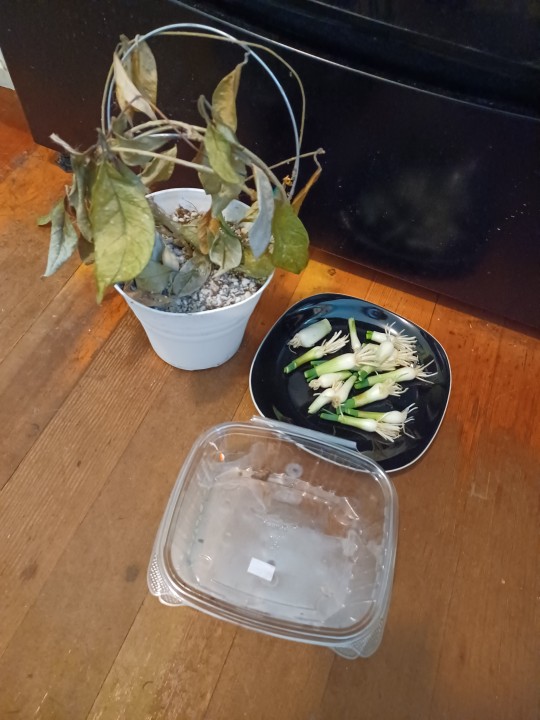
Steps:
1. Remove lid from container, it's now your plant pot's saucer
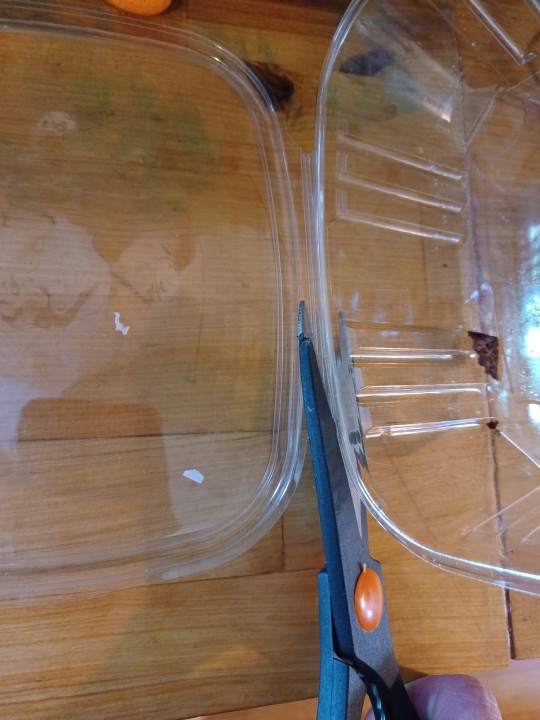
2. Either poke holes very carefully and slowly (not ideal) or slice the corners off with scissors (better)
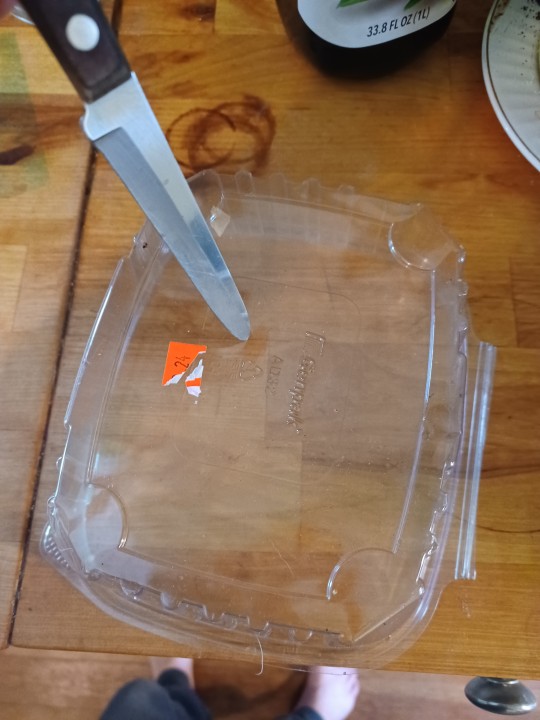

3. Remove soil from the dead plant's pot, put in container. This one was super heavy in perlite (the white stuff, helps with drainage), so I mixed in another pot that had more organic matter (brown stuff, mostly helps retain moisture, sometimes provides nutrients). Water until water comes out the bottom, then let drain in sink until until it's done. Put pot on lid:
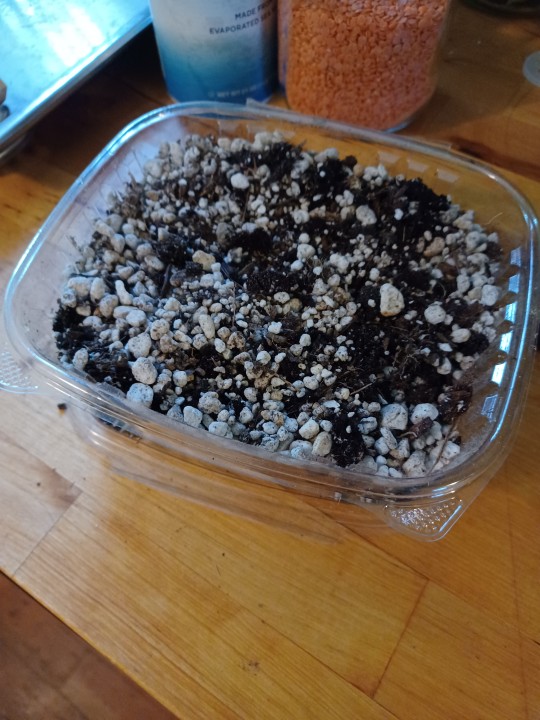
4. Stick the green onions in, deep enough that they can stand up on their own, or until the white part is covered:
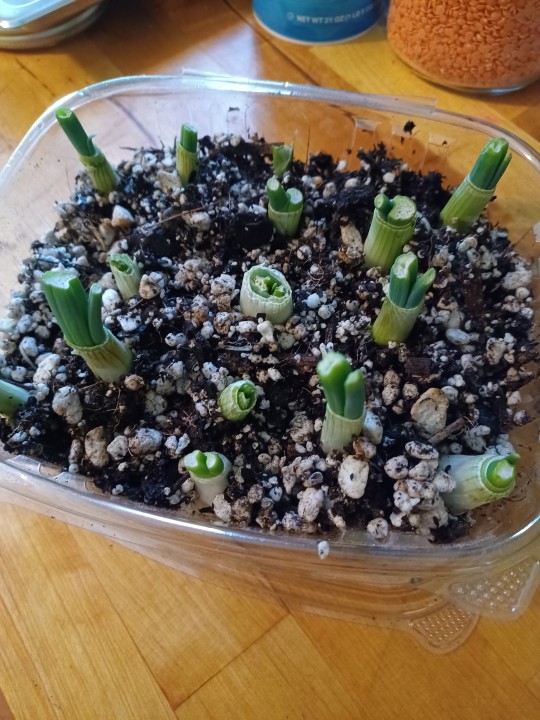
5. Stick in window, water when dry, and wait:
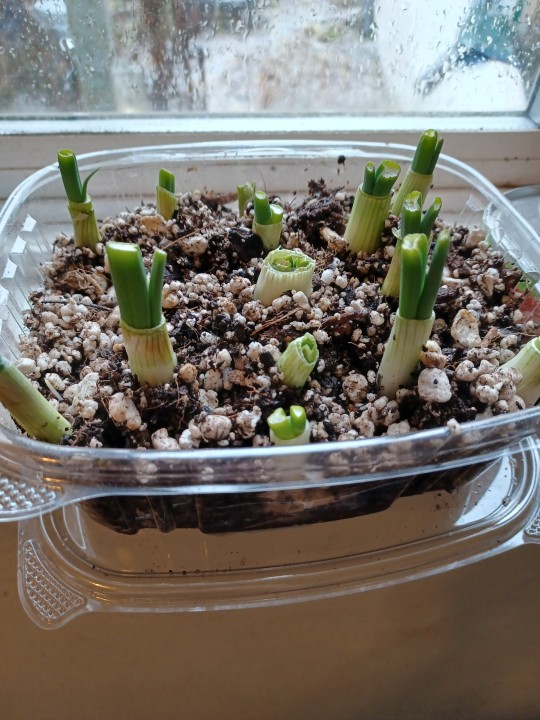
Why not just stick them in water?
Because they make the water really smelly.
Just change the water often, then it won't stink.
I will forget, and then it will stink. Plus, I prefer growing in soil.
Why do you prefer soil?
Thanks for asking! I started because growing them in water didn't work well for me. But on top of that, if you regrow in water, eventually their growth will peter out. This is because in addition to water and carbon dioxide, plants need other nutrients. These are stored in the bulbs of green onions, but they will be depleted by growth if the plant can't replace them. Potting soil often has leftover nutrients, and if you've got compost you can also mix that in.
Why not just put fertilizer in the water?
Two reasons. First off, that's a great way to grow algea, unless you make sure the water isn't getting light. Secondly, most cheap, widely available fertilizers are meant to be used for plants that are in soil, so they're not complete (they're missing iron and maybe some other things? It's been a while since i looked it up). So eventually, if you use water and normal ferts, the plant will stop growing. If you have access to hydroponic ferts, those would work, but you also have enough money that you're not the target audience for this post.
I don't trust the potting soil from random plants.
Completely understandable, and probably smart too. In that case, you have a couple other options if you want soil for free. First off, you could look for dead vegetable or other edible plants in pots, and know that those will not have been treated with something that makes them inedible to humans. You can also look for free bags of partially used potting soil in your local buy-nothing/free stuff groups/craigslist/nextdoor/mutual aid groups.
What if I have some money for soil?
Then you can look for potting soil, or make your own (plenty of recipes online for this)
Help! There are tiny flies that look like fruit flies!
Those are probably fungus gnats, and there's plenty of ways to get rid of them. My two favorites are watering a bit less and adding half an inch of sand to the top, making your plants an unsuitable habitat, or getting a mosquito dunk and keeping it in your watering can. Mosquito dunks have Bt, a type of bacteria that kills mosquitos, fungus gnats, and other related insects. There are other types of Bt that go after other types of insect, such as cabbage moths. It's considered an organic treatment.
What about other pests?
I've literally never seen them get other pests indoors.
How much light do they need?
As much as you can give them, probably. If you have a window that gets midday sun, use that. Or a grow light. If they don't get enough light, they'll be floppy and pale, still edible, but not as flavorful.
When can I harvest?
When it wouldn't look silly to harvest them. I generally wait until they're at least a foot tall (30cm). I'll post an update when I do.
Why didn't you just use the dead plant's pot, dumbass?
A) it didn't have a saucer to protect the surface underneath, B) this is a concept post, and often plant pots are too wide to fit in window sills, and C) I didn't like the pot.
Won't it just grow into a bulb?
Nope, green onions are actually usually a different type than bulbing onions. Usually. And they're perennial! I've never had one try forming a bulb, but you can just eat them if yours do.
Can I ask you another question?
Yep! I'll add it to the update.
194 notes
·
View notes
Text
Finding the Best Hydroponic Farming Workshops in Your Area
Hydroponic farming is gaining popularity as a sustainable and efficient way to grow crops without soil. Whether you’re a beginner or an experienced grower, attending a hydroponic farming workshop can enhance your knowledge and skills. If you're wondering, "Where can I find hydroponic farming training near me?" look no further than Kamala Farms, a leader in hydroponic farming education and innovation.
Why Attend a Hydroponic Farming Workshop?
Hydroponics offers numerous benefits, including faster growth rates, reduced water usage, and the ability to grow crops in limited space. While it may seem complicated at first, a structured workshop can simplify the process, teaching you everything from the basics to advanced techniques. Whether you want to start a home garden or explore commercial farming, finding the right hydroponic farming training near me is the first step toward success.
What to Expect from Hydroponic Farming Training
A comprehensive workshop will cover various aspects of hydroponic farming, including:
Types of Hydroponic Systems: Learn about different setups like NFT (Nutrient Film Technique), DWC (Deep Water Culture), and drip systems.
Nutrient Management: Understand how to mix and manage nutrient solutions that are vital for plant growth in hydroponics.
Lighting and Environmental Control: Hydroponic systems often require specialized lighting and climate control. Workshops provide insights into how to create the best growing conditions.
Plant Varieties: Discover which crops are most suitable for hydroponic farming, whether you're growing leafy greens, herbs, or vegetables.
When searching for hydroponic farming training near me, make sure the workshop offers hands-on experience, allowing you to apply what you've learned in a practical setting.
Why Choose Kamala Farms for Hydroponic Farming Training?
Kamala Farms is renowned for offering top-notch hydroponic farming training near me. With a focus on providing hands-on experience and expert guidance, Kamala Farms ensures that attendees leave with the confidence to start or improve their hydroponic farming journey. Here’s what sets their workshops apart:
Expert Trainers: Kamala Farms’ workshops are led by experienced professionals who have extensive knowledge in hydroponic systems, plant care, and sustainable farming techniques.
Customized Learning: Whether you’re a beginner or an advanced grower, the training sessions at Kamala Farms are tailored to meet different skill levels.
Hands-On Practice: The workshops provide ample opportunities to practice what you’ve learned, making it easier to grasp the complexities of hydroponic farming.
Attending a workshop at Kamala Farms is a great way to ensure you receive high-quality hydroponic farming training near me while getting practical experience.
How to Find Hydroponic Farming Training Near You
To find the best hydroponic farming training near me, start by searching for local farms, agricultural centers, or specialized training facilities that offer courses. You can also check online platforms, where farms like Kamala Farms often advertise their upcoming workshops. Reviews and testimonials can give you an idea of the quality of training provided.
Conclusion
Attending a hydroponic farming training near me is an essential step toward mastering this innovative method of cultivation. By choosing a reputable provider like Kamala Farms, you’ll gain hands-on experience, learn from experts, and acquire the knowledge needed to start or expand your own hydroponic setup. Whether you're a hobbyist or looking to dive into commercial farming, local workshops offer the perfect opportunity to explore the future of sustainable agriculture.
To know more: https://kamalafarms.com/hydroponic-farming-training-in-hyderabad/

0 notes
Text
Fresh Vegetables Market Insights: Comprehensive Global Forecast (2023-2032)

The global demand for Fresh Vegetables was valued at USD 645258.5 million in 2022 and is expected to reach USD 849682.2 Million in 2030, growing at a CAGR of 3.50% between 2023 and 2030.
The fresh vegetables market is a dynamic and essential segment of the global agricultural industry, driven by increasing consumer awareness of health and nutrition. The market encompasses a wide variety of vegetables, including leafy greens, root vegetables, and legumes, among others. Factors such as the rising demand for organic produce, the growing trend towards plant-based diets, and the emphasis on fresh, locally sourced foods are significantly influencing the market's growth. Advancements in agricultural practices, improvements in supply chain logistics, and the expansion of retail and online grocery platforms are also contributing to the market's expansion. Additionally, government initiatives supporting sustainable farming and the reduction of food waste are playing a crucial role in shaping the future of the fresh vegetables market.
Fresh Vegetables Market Key Findings of Study:
Organic Produce Demand: There is a significant increase in consumer preference for organic vegetables, spurred by health consciousness and concerns over chemical residues in conventionally grown produce. Organic vegetables now constitute a substantial segment of the overall market.
Technological Advancements: Innovations in agricultural technology, including precision farming, hydroponics, and vertical farming, are enhancing the yield and quality of fresh vegetables. These technologies are particularly impactful in urban areas with limited arable land.
Supply Chain Improvements: Enhanced supply chain logistics, including cold chain infrastructure and efficient transportation systems, have improved the distribution and shelf life of fresh vegetables, reducing food waste and ensuring better availability.
Retail and E-commerce Growth: The expansion of retail chains and online grocery platforms has made fresh vegetables more accessible to a wider consumer base. E-commerce, in particular, has seen a surge in fresh vegetable sales, driven by the convenience of home delivery services.
Sustainability Initiatives: Government policies and industry initiatives focused on sustainable farming practices are positively impacting the market. Efforts to reduce carbon footprints, minimize pesticide use, and promote water conservation are gaining traction.
Regional Insights: Asia-Pacific remains the largest market for fresh vegetables, owing to the region's large population and dietary preferences. North America and Europe are also significant markets, with a high demand for organic and locally sourced vegetables.
Consumer Trends: There is a growing trend towards plant-based diets and vegetarianism, which is boosting the demand for a variety of fresh vegetables. Consumers are increasingly seeking diverse and exotic vegetable options to incorporate into their diets.
Challenges: Despite the positive outlook, the market faces challenges such as fluctuating weather conditions, pest infestations, and the high cost of organic farming. Addressing these challenges is crucial for sustained market growth.
Key Players-
Dole Food Company, Inc.
Fresh Del Monte
Keelings
Tanimura & Antle
BelOrta
FreshPoint Inc.
Mirak Group
C.H. Robinson Worldwide, Inc.
Goknur Gida
Fruitable Fresh Sdn Bhd.
Global Fresh Trading FZE
More About Report- https://www.credenceresearch.com/report/fresh-vegetables-market
Fresh Vegetables Market Growth Opportunities:
Organic Vegetables: The increasing consumer preference for organic products presents a significant growth opportunity. Expanding the cultivation and supply of organic vegetables can tap into the growing health-conscious market segment willing to pay a premium for chemical-free produce.
Vertical Farming and Urban Agriculture: Innovations in vertical farming and urban agriculture offer opportunities to grow fresh vegetables in urban areas, reducing transportation costs and providing local communities with fresh produce. These methods also optimize space usage and water efficiency, addressing sustainability concerns.
E-commerce and Direct-to-Consumer Sales: The surge in online grocery shopping and direct-to-consumer sales channels provides an opportunity to reach a broader customer base. Developing robust e-commerce platforms and home delivery services can cater to the increasing demand for convenience among consumers.
Value-Added Products: Introducing value-added products such as pre-cut, pre-washed, and ready-to-cook vegetable packs can attract busy consumers looking for convenience without compromising on freshness and nutrition. This segment is particularly appealing to working professionals and urban households.
Exotic and Specialty Vegetables: Diversifying the product portfolio to include exotic and specialty vegetables can cater to niche markets and food enthusiasts seeking unique culinary experiences. This can also attract restaurants and gourmet food providers looking for premium ingredients
Sustainability and Eco-Friendly Practices: Emphasizing sustainable farming practices, such as organic farming, integrated pest management, and water conservation, can attract environmentally conscious consumers. Marketing these efforts can enhance brand reputation and customer loyalty.
Health and Wellness Trends: Capitalizing on the rising health and wellness trends by promoting the nutritional benefits of fresh vegetables can drive demand. Collaborations with health influencers, dietitians, and fitness programs can amplify these benefits and reach health-focused consumers.
Local Sourcing and Farm-to-Table Initiatives: Promoting locally sourced vegetables through farm-to-table initiatives can appeal to consumers interested in supporting local farmers and reducing their carbon footprint. Establishing partnerships with local farmers and markets can strengthen supply chains and community ties.
Foodservice Industry Partnerships: Collaborating with the foodservice industry, including restaurants, hotels, and catering services, can create a steady demand for fresh vegetables. Providing high-quality, consistent supply to these businesses can foster long-term partnerships and business growth.
Educational Campaigns and Consumer Awareness: Conducting educational campaigns to raise awareness about the benefits of consuming fresh vegetables and how to incorporate them into daily diets can boost market demand. Hosting workshops, cooking classes, and farm visits can engage consumers and promote vegetable consumption.
Segmentation-
By Types of Vegetables:
Leafy Greens
Cruciferous Vegetables
Root Vegetables
Nightshade Vegetables
Allium Vegetables
Legumes
By Organic vs. Conventional:
Organic Vegetables
Conventional Vegetables
By Distribution Channels:
Retail
Online Retail
Wholesale
Export/Import
By Processed vs. Fresh-cut Vegetables:
Fresh Vegetables
Processed Vegetables
Fresh-cut Vegetables
Browse the full report – https://www.credenceresearch.com/report/fresh-vegetables-market
Browse our Blog: https://www.linkedin.com/pulse/fresh-vegetables-market-key-industry-dynamics-yizpf
Contact Us:
Phone: +91 6232 49 3207
Email: [email protected]
Website: https://www.credenceresearch.com
0 notes
Text
Exploring the Fascinating World of Hydroponic Plants: A Guide to Plants That Thrive in Water
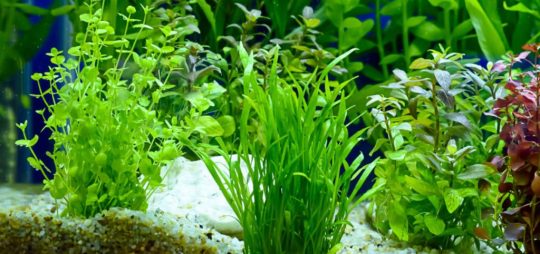
Benefits of Growing Plants in Water: Before delving into the specific types of plants that can be grown in water, let's explore why hydroponic gardening has become increasingly popular among enthusiasts. Growing plants in water offers several notable advantages:
Efficient Nutrient Delivery: In a hydroponic system, plants receive essential nutrients directly from the water, ensuring efficient nutrient uptake and utilization. This often results in faster growth rates and higher yields compared to traditional soil-based gardening.
Water Conservation: Hydroponic systems typically require less water than conventional soil-based gardens since water is recirculated within the system rather than being lost to evaporation or runoff.
Space Efficiency: Hydroponic systems can be designed to maximize space utilization, making them ideal for urban environments or areas with limited gardening space.
Reduced Risk of Pests and Diseases: By eliminating soil from the equation, hydroponic gardening reduces the risk of soil-borne pests and diseases, leading to healthier plants and lower maintenance requirements.
Types of Plants That Grow in Water: Now, let's explore some of the most popular types of plants that thrive in water-based environments:
Herbs: Herbs such as basil, mint, cilantro, and parsley are well-suited for hydroponic cultivation. They thrive in water-rich conditions and can be grown year-round indoors.
Leafy Greens: Lettuce, spinach, kale, and Swiss chard are excellent choices for hydroponic gardening. These leafy greens grow vigorously in water and can be harvested continuously for a steady supply of fresh produce.
Vegetables: Certain vegetables, including tomatoes, cucumbers, peppers, and beans, can be successfully grown hydroponically. With the right nutrient solution and environmental conditions, these plants can produce bountiful harvests.
Flowers: Some flowering plants, such as African violets, peace lilies, and begonias, can thrive in water-based environments. These plants add beauty and color to indoor spaces while requiring minimal maintenance.
Ornamentals: Many ornamental plants, including lucky bamboo, pothos, philodendron, and spider plant, can be grown hydroponically. These plants are prized for their aesthetic appeal and air-purifying properties.
Tips for Successful Hydroponic Gardening: To maximize success when growing plants in water, aquarium online consider the following tips:
Use a Suitable Growing Medium: While plants in hydroponic systems primarily grow in water, they often benefit from a supportive growing medium such as perlite, clay pellets, or coconut coir.
Maintain Proper Nutrient Levels: Regularly monitor nutrient levels in the water and adjust accordingly to ensure plants receive the essential elements they need for healthy growth.
Provide Adequate Lighting: Supplemental lighting may be necessary, especially when growing plants indoors. Choose high-quality grow lights that provide the appropriate spectrum for photosynthesis.
Monitor pH Levels: Maintain the pH of the nutrient solution within the optimal range for the specific plants you are growing. pH levels that are too high or too low can inhibit nutrient uptake and lead to nutrient deficiencies.
Prevent Algae Growth: Algae growth can be a common issue in hydroponic systems exposed to light. To prevent algae buildup, use opaque containers or coverings to block out light and maintain water quality.
0 notes
Text
Buy Hydroponic Brinjal Online in Delhi NCR | Inhydrogreens

Hydroponic Brinjal is a rich source of dietary fibre hence promotes digestion. It helps in maintaining blood sugar and cholesterol levels. It contains phytonutrients which protects our cells from getting damaged and has strong anti-bacterial properties.
#Hydroponic Brinjal online#Green Basket#Hydroponic Salad Store In Delhi NCR#Hydroponics Vegetables Online#Hydroponics Store Near Me#Hydroponic Vegetables Stores in Delhi NCR#Buy Hydroponic Chives online#Buy Hydroponic Herbs Online#Buy Fresh Herbs Online#Mix Lettuce Box#Buy Online Microgreens Box#Buy Hydroponic Microgreens#Hydroponic Vegetables Online#Leafy Green Vegetables in Delhi#Fresh Herbs Online Delhi#Buy Chopped Vegetables#Chopped Vegetables Online
1 note
·
View note
Text
Exploring Organic Veg Boxes: A Healthier Choice for Your Family
Many families in Leeds choose to buy fruit and veg box delivery in Leeds to live healthier. An organic veg box can help your family make healthier food choices. It addresses concerns about pesticide use, sustainability, and access to fresh produce.
Subscription services deliver boxes of seasonal fruits and vegetables. They are sourced from organic or low-impact farms. Leeds Veg Box works with local farmers. These farmers are committed to sustainable growing practices. They don't use harmful chemicals or unnecessary processing. Organic vegetables Leeds but in the convenience of a weekly box.
Benefits of an Organic Veg Box
Having nutritious, organic produce conveniently delivered right to your door provides some major benefits for a busy family.

Less Exposure to Pesticides
Choosing organic means dramatically reducing your family’s exposure to toxic pesticide residues common on conventionally grown produce. This provides important health protections, especially for young children.
More Nutrients
Organic farming practices build healthy soil, which means the food grown in it is more nutrient-dense. That’s important to help our kids’ growing bodies and minds get the necessary vitamins, minerals, and antioxidants.
Environmentally Friendly
Organic agriculture nurtures biodiversity and soil health without synthetic pesticides and fertilizers that pollute air and waterways. Veg box delivery minimizes food miles while supporting the local economy too. It’s a sustainable choice all around.
Convenience
No more fighting crowds at the supermarket after a long work day. Veg boxes show up reliably when and where you want them. Some providers even allow you to customize your weekly order – all with no plastic packaging waste.
What to Expect in an Organic Veg Box
Most veg box subscriptions allow you to choose a box size and frequency to meet your household’s needs. Here’s an idea of what might arrive in a typical weekly order:
Fruits include apples, oranges, pears, plums, melons, and berries. What’s available changes with the growing season.
Veggies – sticks of carrots and celery, potatoes, onions, salad greens, broccoli, cauliflower, squash, etc. Again, seasonal variety throughout the year.
Herbs – parsley, basil, cilantro, mint delivered fresh in bunches. Great for flavoring dishes instead of salt.
Extras – some providers offer fruit juices, eggs, baked goods, cheese, or meat produced locally and sustainably. Nice additions to complement the produce.

Veg Box Leeds continues innovating to serve best modern families seeking healthy lifestyles. Organic Veg Boxes Near Me through Leeds Veg Box partners with regional farmers – check them out for convenient local organic produce delivery straight to your Leeds home or office.
Organic Fruit and Veg Delivery is Easier Than Ever
Gone are the days of needing to schedule an extra weekly trip to stock up on fresh organic produce. Organic veg box delivery services are now more convenient for families. They provide nutrient-dense fruits and veggies from local, sustainable sources. More farmers are choosing organic practices. Consumers want chemical-free options for health and ethical reasons. This is causing rapid growth in the organic grocery category.
Luckily, many farms in the Leeds area offer community-supported agriculture programs. They also provide delivery boxes filled with freshly harvested goodies. You can find many choices for personalized fruit and veg delivery Leeds online. You can find organic veg box delivery Leeds. They can match your preferences and budget.
When comparing offerings, be sure to check:
Where are the farms located and how far must produce travel? Supporting truly local growers reduces food miles.
How customizable is the box selection and delivery schedule? More choices and flexibility often work better for finicky family needs.
What growing practices are used? Organic? Low-spray or chemical-free? Hydroponic? Important distinctions for produce purity.
Does box packaging generate waste? Some farms use recyclable/compostable materials or omit packaging completely.
0 notes
Text

Al Falaj Gardens - Submersible Pumps Dubai
We provide outstanding agricultural solutions. With the help of our experts, we can construct gardens and produce crops that are optimal for the agroclimatic conditions of the area. Contact us at Falaj Garden so that we can assist you completely. https://falajgarden.com/product-category/irrigation-items/pumps/
#Irrigation fittings#Garden Pots Dubai#Indoor outdoor garden plants#Drip irrigation accessories online#Vegetable Seed suppliers in UAE#Vertical garden items UAE#Agricultural grow lights Dubai#Hydroponic system supplier in UAE#Hydroponics companies in UAE
0 notes
Text
Flower Delivery in Indonesia: Why Flowers Are The Best Gifting Option
Indonesia has a very favorable tropical climate with very fertile soil. The geographic locations complement its plantations of various types of trees, flowers, vegetables, fruits, etc. Indonesia has been known for its diversified cultivation of some authentic floral species.
The diverse ecosystem of Indonesia helps its cultivation and growth of numerous endangered species. The floral market margins a greater part of Indonesia’s total GDP. Many farmers or gardeners with minimal skills generate decent revenue from floral cultivation.

Flower Cultivation in Indonesia-
Indonesia, a central spot with all geographical complementaries, generates one of the highest revenues out of the floral market. Being the biggest supplier of some authentic floral species, Indonesia has gained recognition around the globe for this. With the increasing demands, many online ways of flower delivery in Indonesia have been increasing and enhancing employment here.
Here is an insight into some of the key features of flower cultivation in Indonesia-
Floral Diversity- Indonesia has one of the leading floral markets in the world, including native and introduced plant species. The favorable climatic and soil condition enriches the soil and gives space for cultivating every flower species.
Cultivation techniques- To ensure optimal growth and healthy flower production, cultivators in Indonesia use modern advanced techniques and traditional methods. Traditional methods like hydroponics, greenhouse cultivation, and open-field cultivation are used.
Flower farms- From large-scale floral industry to small-scale floral farms, every type of farm can be found in Indonesia. Flower farms often specialize in cultivating a specific flower species, depending on the demand and need of the market.
Export Industry- Flowers are a significant agricultural commodity in Indonesia. The flower market in Indonesia contributes significantly to the export revenue generation of the country. Indonesia exports flowers to its neighboring countries, including- Southeast Asian countries, Europe, North America, etc.
Significance of Gifting Flowers-
Gifting flowers as a token of love has a significant meaning behind it. Flowers represent freshness and new beginnings. They are one of the subtle yet, elegant ways of gifting.
Here is why you can gift flowers and take advantages of flower delivery in Indonesia-
Expressing emotions- No matter in which mood you are, flowers always get to bring a wide smile to your face. Flowers are a powerful way to express any kind of emotion you hold. Various flowers signify each emotion and mood.
Love language- If you want to express your love and need clarification about what to gift, get a bunch of flowers. Flowers are the best way to show your love. Flowers communicate a thousand words in a single frame.
Healing and comfort- flowers can cure your ailments and do magic upon anyone. They have a very comforting and healing effect that offers people solace during hard times.
Conclusion
Overall, flowers are a symbolic representation of positivity, peace, and purity. The flowers’ inherent beauty, elegance, charm, and vibrancy can sway every sorrow and pain.
Gifting flowers as a present has become very popular in and around Indonesia. Flower delivery in Indonesia is expanding and is fulfilling many wishes and surprises.
Source URL:https://www.reddit.com/user/angelinawatson01/comments/16gi8w6/flower_delivery_in_indonesia_why_flowers_are_the/?utm_source=share&utm_medium=web2x&context=3
0 notes
Text
Canada Horticulture Market Outlook, Demand, Forecast 2022-2029
BlueWeave Consulting, a leading strategic consulting and market research firm, in its recent study, estimated Canada horticulture market size at USD 1.78 billion in 2022. During the forecast period between 2023 and 2029, BlueWeave expects Canada horticulture market size is to grow at a CAGR of 10.02% reaching a value of USD 3.17 billion by 2029. Growing consumer knowledge of environmental and health issues is one of the main drivers propelling the expansion of the Canadian horticulture business. This awareness is also driving consumers to want more locally grown and organic products. As a result, urban farming, community-supported agriculture (CSA), and farmers' markets have increased. Also, environmentally friendly and sustainable practices are gaining popularity, with a focus on integrated pest management, effective irrigation methods, and water saving. There is a rise in vertical farming and indoor gardening, which take advantage of cutting-edge technology like hydroponics and aquaponics. As Canadians invest more in enhancing the beauty of their homes and outdoor areas, the market is shifting in favor of ornamental plants and landscaping services.
Canada Horticulture Market – Overview
Horticulture is the branch of agriculture that focuses on the cultivation, management, and study of plants, primarily those used for ornamental purposes, food production, and landscaping. It encompasses a wide range of activities, including growing fruits, vegetables, flowers, and herbs, as well as the maintenance of gardens, parks, and nurseries. Horticulture combines scientific knowledge and techniques with practical skills to maximize plant growth, improve crop yields, and enhance the aesthetic appeal of outdoor spaces. It involves various practices, such as plant propagation, pest control, soil management, and irrigation. Horticulture plays a vital role in providing food security, preserving biodiversity, and creating visually appealing landscapes for human enjoyment.
Sample Request @ https://www.blueweaveconsulting.com/report/canada-horticulture-market/report-sample
Impact of COVID-19 on Canada Horticulture Market
The COVID-19 pandemic significantly impacted the Canada horticulture market. As the virus spread and restrictions were imposed, the horticulture industry faced numerous challenges. Lockdowns and social distancing measures disrupted the supply chain, leading to labor shortages and difficulty in sourcing inputs. Retail sales were also affected as garden centers and nurseries faced temporary closures or reduced operations. However, there was an increased interest in home gardening and plant cultivation as people spent more time indoors. Online sales and direct-to-consumer models gained prominence. The horticulture market witnessed a shift in consumer preferences towards sustainable and locally sourced products. Despite the challenges, the industry demonstrated resilience and adapted to the evolving market conditions.
Canada Horticulture Market – By Propagation
By propagation, Canada horticulture market is divided into Seed, Vegetative, Layering & Cutting, Grafting, and Breeding segments. The seed segment dominates the market share. This segment involves the production and distribution of plants through the use of seeds. It encompasses activities such as seed collection, processing, and sales. The seed segment is crucial in horticulture as it serves as the foundation for plant growth and development. It allows for the cultivation of a wide variety of plants, including fruits, vegetables, and ornamental plants. Due to the diverse agricultural practices and consumer demand for different plant species, the seed segment holds significant importance and contributes significantly to the overall horticulture industry in Canada.
Competitive Landscape
Canada horticulture market is fiercely competitive. Major companies in the market include Sunrite Greenhouses Ltd, Mucci Farms, NatureFresh Farms, Mastronardi Produce Ltd, Village Farms International Inc., Windset Farms, Red Sun Farms, BC Hot House Foods Inc., Quebec Hothouse, and Greenhouse Vegetable Growers (GVG). These companies use various strategies, including increasing investments in their R&D activities, mergers, and acquisitions, joint ventures, collaborations, licensing agreements, and new product and service releases to further strengthen their position in Canada horticulture market.
Contact Us:
BlueWeave Consulting & Research Pvt. Ltd
+1 866 658 6826 | +1 425 320 4776 | +44 1865 60 0662
0 notes